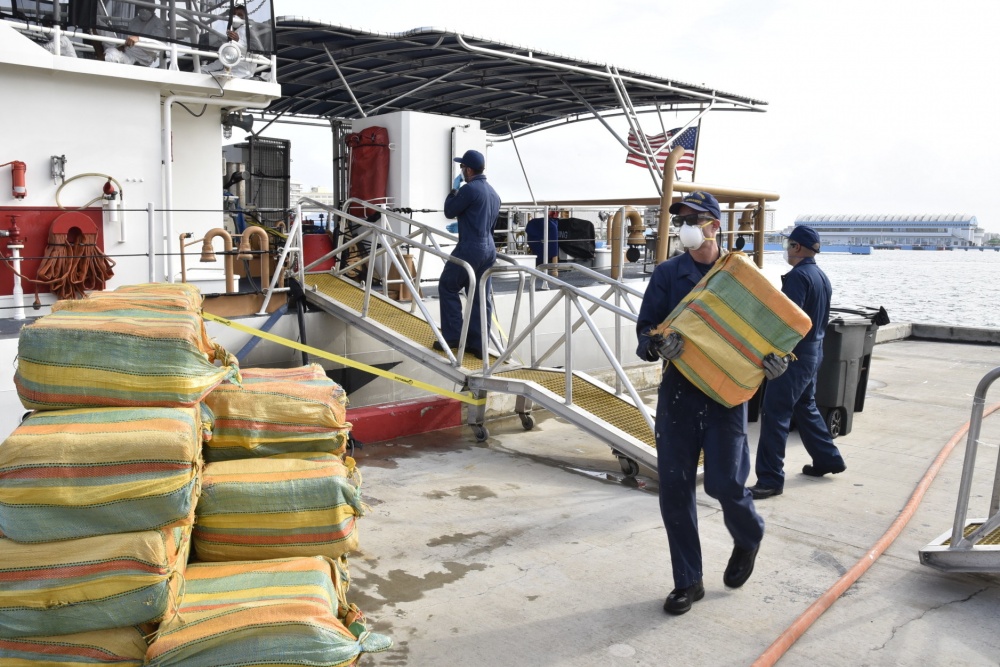SAN JUAN — The crew of the Coast Guard Cutter Heriberto Hernandez offloaded approximately 1,981 kilograms of cocaine, 28 kilograms of amphetamines and six suspected smugglers at Sector San Juan Friday, following two separate interdictions in the Caribbean Sea.
The seized illegal narcotics have a wholesale value of at least $48 million, the Coast Guard said.
The interdictions are the result of multi-agency and international partnership efforts in support of U.S. Southern Command’s enhanced counter-narcotics operations in the Western Hemisphere, the Organized Crime Drug Enforcement Task Force (OCDETF) program and the Caribbean Corridor Strike Force (CCSF). The United States Attorney’s Office for the District of Puerto Rico is leading the prosecution for the two cases.
“The Coast Guard is uniquely equipped to support the U.S. Navy and partner nation navies and coast guards in the interdiction of illicit drugs,” said Rear Adm. Eric C. Jones, Seventh Coast Guard District commander. “Our relationships with nations across the Caribbean basin, along with our law enforcement authorities, enable us to provide essential support to the mission against international criminal networks attempting to smuggle people and drugs into the U.S. We strive to continue building these relationships, further enabling our essential missions that safeguard the American people and our nation’s vital maritime commerce.”
“We continue to work with federal and state law enforcement agencies, along with our partners from the Royal Netherlands and United Kingdom navies, against drug traffickers in our area,” said W. Stephen Muldrow, U.S. Attorney for the District of Puerto Rico. “These seizures mark two more successful operations in our fight against criminal organizations attempting to use our territories as a hub for their illegal operations.”
The most recent interdiction occurred Monday, Sept. 28. During a routine patrol of the RFA Argus, a Royal Fleet Auxiliary ship from the United Kingdom, the ship’s helicopter crew observed a suspect go-fast vessel with multiple packages and barrels of fuel onboard. The HNLMS Groningen, a Holland-class offshore patrol vessel from the Royal Netherlands Navy that was operating nearby with a Coast Guard Law Enforcement Detachment onboard, responded and interdicted the go-fast with the assistance of the ship’s surface asset.
The crew of the HNLMS Groningen embarked three smugglers; a Colombian, a Venezuelan and a Dominican Republic national from the go-fast. They also located and recovered aboard the go-fast 49 bales that weighed 1,721 kilograms and tested positive for cocaine, and one package that weighed 28 kilograms and tested positive for amphetamines.
The second interdiction occurred Sept. 24, after the aircrew of a U.S. Customs and Border Protection maritime patrol aircraft detected a suspicious 35-foot go-fast vessel transiting without the use of navigational lights. Coast Guard watchstanders in Sector San Juan directed the launch of a Coast Guard Air Station Miami HC-144 Ocean Sentry aircraft that relieved the first aircraft and maintained aerial coverage of the go-fast.
The cutter Heriberto Hernandez responded to the sighting and interdicted the go-fast with the assistance of the cutter’s small boat and the Coast Guard aircrew. The Coast Guard boarding team embarked the three men, who claimed to be Dominican Republic nationals, along with 13 bales of suspected contraband that were located under a blue tarp aboard the go-fast. The seized contraband tested positive for cocaine and weighed 260 kilograms.
The cutter Heriberto Hernandez transported the seized contraband and suspected smugglers from both cases to Sector San Juan, where awaiting federal law enforcement agencies received custody.
Cutter Heriberto Hernandez is a 154-foot fast response cutter homeported in San Juan, Puerto Rico.
On April 1, U.S. Southern Command began enhanced counter-narcotics operations in the Western Hemisphere to disrupt the flow of drugs in support of Presidential National Security Objectives. Numerous U.S. agencies from the Departments of Defense, Justice and Homeland Security cooperated in the effort to combat transnational organized crime. The Coast Guard, Navy, Customs and Border Protection, Federal Bureau of Investigation, Drug Enforcement Administration, and Immigration and Customs Enforcement, along with allied and international partner agencies, play a role in counter-drug operations.
The fight against drug cartels in the Caribbean Sea requires unity of effort in all phases from detection, monitoring and interdictions, to criminal prosecutions by international partners and U.S. Attorneys Offices in districts across the nation. The law enforcement phase of counter-smuggling operations in the Caribbean Sea is conducted under the authority of the Coast Guard 7th District, headquartered in Miami, Florida. The interdictions, including the actual boardings, are led and conducted by members of the U.S. Coast Guard.
The Caribbean Corridor Strike Force (CCSF) is a multi-agency Organized Crime Drug Enforcement Task Force group operating in the District of Puerto Rico focusing on Caribbean and South American-based Transnational Criminal Organizations involved in the maritime and air smuggling of shipments of narcotics to and from Puerto Rico and to the Continental U.S. and in the laundering of drug proceeds using bulk cash smuggling and sophisticated laundering activities. CCSF signatory agencies include the DEA, HSI, FBI, CGIS, USMS, and the U.S. Attorney’s Office.



